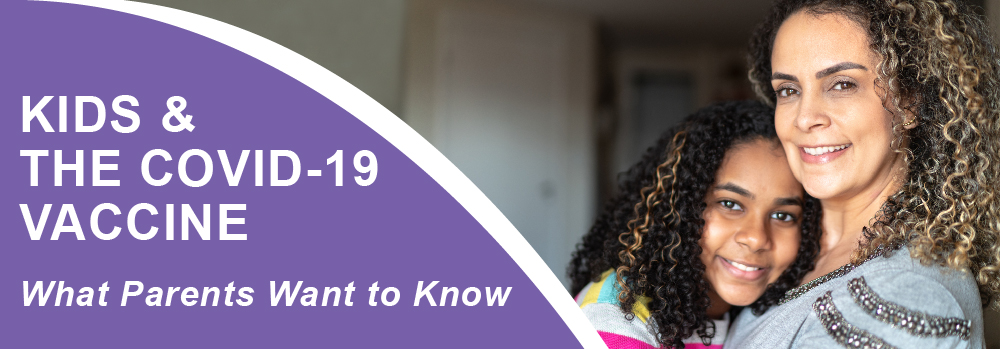What parents want to know

The U.S. Food and Drug Administration (FDA) has approved the Pfizer COVID-19 vaccine to be used to vaccinate children ages 12-15. While this is encouraging news and yet another step toward ending the COVID-19 pandemic, we understand that parents may have questions about the vaccine. IHA supports the scientific data behind this most recent vaccine and fully supports vaccination as the best way to end the pandemic. COVID-19 vaccines are safe and effective, with more than 261.5 million doses administered in the United States. Vaccinating this age group will help kids get back to their normal lives including school, sports and more, while keeping high-risk family members and others safe. Read on for answers to the most frequently asked questions around children and the COVID-19 vaccine. If you have additional questions or concerns, don’t hesitate to contact your pediatric provider.
How safe is the mRNA vaccine? The COVID-19 mRNA vaccines are safe and effective.*
• The mRNA vaccine technology is not new for COVID19. We were able to get to this point quickly because this vaccine has actually been in development for years
• It was first developed during the 2003 SARS outbreak. Scientists were able to adjust the vaccine they had been creating back then
• In early 2000s we were not successful since mRNA breaks down VERY quickly and it needed to be transported by something. Finding that something has been a challenge until now. Scientists tried fat bubbles for COVID19, and it worked! • mRNA is more than just DNA’s lesser-known cousin, RNA plays a role in turning on information for your body’s proteins. This remarkable molecule can carry the instructions (messenger RNA or mRNA)
• Scientists believe an mRNA vaccine could be safer for us compared to traditional vaccines because they are NOT made up of the actual pathogen. This means that, unlike traditional vaccines, they do not contain weakened, dead, or noninfectious parts of a virus. They contain only the instruction manuals to tell cells how to fight COVID19. You cannot get COVID19 from the vaccine since it’s just instructions on how to fight it.
• The other cool thing about mRNA vaccines is that they quickly degraded in the body. After it does its job boosting your immunity against COVID19, it is gone. It cannot insert itself into human DNA.
• Even though everyone can react differently, the boosting immunity part is why many feel common side effects of fever, headache, swollen lymph nodes, tried or achy for a day or two. These are all normal signs that tell you your immune system is working to build up the fight against COVID19, even in kids.
• Only time can tell us, but since the mRNA technology degrades itself after sending its message and mounting an immune response, it gives scientist confidence that there will not be long term side effects. From the many years of vaccine experience, we do know it’s rare to see concerning side effects happen after six weeks in any vaccine.
*Source: PHG Foundation
My Child had COVID-19. Do they still need the vaccine? Yes.
• The vaccine strengthens your immune response
• The vaccine protects better against variants than natural immunity
• The natural immunity is not as effective as the vaccine and it goes down after a few months
• Checking antibody titers is not very helpful since we don’t know enough. We cannot say for sure even if you have antibodies that you are fully immune, which variants are included or who long the immunity will last.
Does COVID-19 really affect kids? Yes.
• Children account for 22.4% of COVID cases
• Children make, on average, 13.8% (or 3.78 million total cases) of all COVID19 cases in the U.S. But this is changing. According the American Academy of Pediatrics, last week children accounted for 22.4% of cases (71,649 out of 319,601 COVID diagnoses). Just one year ago, pediatric cases made up 3% of U.S. cases.
• Some studies have reported 25% of children suffered persistent symptoms after COVID and many can have prolonged symptoms of fatigue with increased physical activity.
*Source: American Academy of Pediatrics
Should I be concerned about the COVID-19 vaccine and infertility? No.
• There has not been any data to support concerns regarding infertility.
• In early December 2 scientists in Europe were part of freedom movement that raised concerns that the one of the COVID virus proteins could interfere with the placenta. However, there was no research or evidence to back up this claim. We now know that COVID virus protein does not cause infertility. If fact, due to the pandemic, the rate of pregnancy has increased along with the number of COVID cases! If a disease doesn’t have the potential to cause concern, neither does the vaccine.
• Click here to learn more from Paul Offit, MD, Director of Vaccine Education Center at Children’s Hospital of Philadelphia, on why this claim is false.
Vaccine scheduling for adolescents is coming soon!
Stay updated with the latest information on the COVID-19 vaccine and scheduling a vaccine for your child or yourself.
